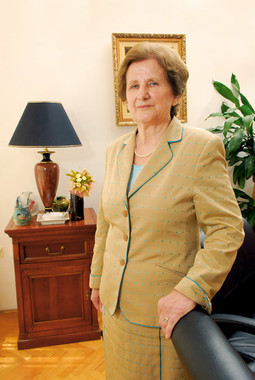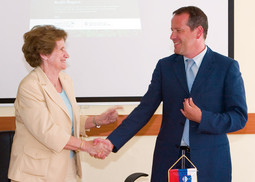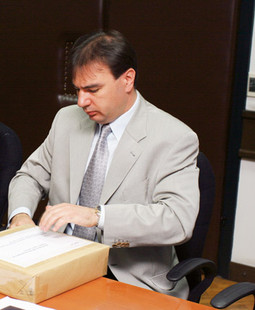Published in Nacional number 606, 2007-06-26
AUDITOR'S DIAGNOSIS OF THE CPF
"Parliament has known of crime in the Fund since 2003"
SIMA KRASIC, the chief state auditor, reveals all of the illegalities she discovered during the supervision of the work of the CPF
 The State Audit Office and its long-time head Sima Krasic found themselves in the centre of public attention last week after the actions of the Maestro anti-corruption operation in which, among others, three vice presidents of the Croatian Privatisation Fund (CPF) were arrested. Given the fact that the job of the State Audit Office is to monitor the operations of all state institutions and companies, President Stipe Mesic publicly admonished Sima Krasic and her office for, as he said, a poorly executed audit of the CPF. What he actually wanted to say was that state auditors had not done their job well because if they had, the corruption at the CPF would have been discovered earlier.
The State Audit Office and its long-time head Sima Krasic found themselves in the centre of public attention last week after the actions of the Maestro anti-corruption operation in which, among others, three vice presidents of the Croatian Privatisation Fund (CPF) were arrested. Given the fact that the job of the State Audit Office is to monitor the operations of all state institutions and companies, President Stipe Mesic publicly admonished Sima Krasic and her office for, as he said, a poorly executed audit of the CPF. What he actually wanted to say was that state auditors had not done their job well because if they had, the corruption at the CPF would have been discovered earlier.
Sima Krasic is the first and for now the only chief state auditor. She was appointed to the post by Croatian parliament in April of 1994. As she says herself, she accepted the post at the urging of Mladen Vedris and then Prime Minister Nikica Valentic. In April of 2002, she was appointed to her second eight-year mandate. A graduate of economics by profession, she took part in the structuring and management of the financial and tax service in the city of Zagreb, and was employed in its administration. She participated in creating the tax system and structuring the tax service in Croatia.
In her interview for Nacional Sima Krasic explains how auditors during the monitoring of the CPF, especially after the revision of the conversion and privatisation, on several occasions suspected that there was corruption involved in the sale of state property and that they made regular reports to this effect to Parliament and the State Attorney's Office.
NACIONAL: Do you agree with the evaluation that the Croatian Privatisation fund is one of the biggest centres of corruption in Croatia?
- It is not up to us make those kinds of evaluations. Our office regularly, once a year, carries out an audit of the operations of all state institutions, and so too of the CPF. We also carry out an audit of the sale of stakes and shares of companies in the CPF portfolio. We also did an audit of the conversion and privatisation, so that we have spent a great deal of time at that institution. We described irregularities we established during audits in reports and these reports were submitted to Croatian Parliament and other competent institutions.
NACIONAL: What are the most significant irregularities discovered to date by the State Audit Office at the CPF?
- It was often the case that the value of a company was not appraised realistically. Also, in many cases we could not discover the number of offers that had been submitted to public tenders for the sale of a company. Auditors on several occasions discovered that companies were sold by announcing a sale tender after a letter of intent from the buyer had already arrived at the CPF. Only a single bid would be submitted to the tender from that same buyer. Also some shares and stakes were sold on instalment payments, and instruments of payment guarantee and interest had not been contracted. There were irregularities because criteria for the sale of a company under the nominal value had not been established. We often came across situations where the means of guaranteeing payment of stocks, such as mortgages or bank guarantees, were subsequently replaced with poorer means of guarantee. Concretely, a mortgage on property was replaced with purchased shares. Besides, buyers of shares who had not settled their obligations made use of administrative rights.
 Illegalities also took place with the property of companies. With some companies a part of the property was not included in the estimate of value, and the company later on sold that property and gained financial benefit. The CPF also changed the value of companies, without the documentation revealing the reasons for the change. The constant repetition of the same irregularities prompted us in 2003 to carry out an audit of the sale of shares and stakes in companies since the founding of the CPF in 1993. The report was submitted to Parliament and the State Attorney's Office. We are currently doing an audit for the years 2004, 2005 and 2006, and we will submit the report to parliament after the summer.
Illegalities also took place with the property of companies. With some companies a part of the property was not included in the estimate of value, and the company later on sold that property and gained financial benefit. The CPF also changed the value of companies, without the documentation revealing the reasons for the change. The constant repetition of the same irregularities prompted us in 2003 to carry out an audit of the sale of shares and stakes in companies since the founding of the CPF in 1993. The report was submitted to Parliament and the State Attorney's Office. We are currently doing an audit for the years 2004, 2005 and 2006, and we will submit the report to parliament after the summer.
NACIONAL: Did the situation improve after 2003?
- Similar irregularities appeared again. We are for this reason monitoring the sale of shares, i.e. stakes in companies from the CPF on the stock exchange and via public tenders.
NACIONAL: That means that for the past seven years the State Audit Office has uncovered a series of illegalities in the work of the CPF, but there was only a reaction a year ago with the launching of the anti-corruption Operation Maestro?
- The State Audit Office ascertains how operations were to have been carried out and if what was done was in line with legislation. We do not have a mechanism whereby we could punish someone or to make them do as they should. All of our reports are passed on to Parliament, MPs accepted them and they are published on the Office's web site. This is where our responsibility ends.
NACIONAL: What kinds of irregularities did you uncover in the sectors led by the arrested CPF vice presidents?
- In 166 cases real estate and other property were not the subject of conversion. Some of them sold the companies and the money from the sale was not paid to the Fund. We ordered the Fund to rectify this, that that property be returned to the state. We notified the State Attorney's Office of this and Government also request a report on the matter from the CPF.
NACIONAL: What is the situation in the sales sector led by arrested CPF vice president Ivan Gotovac?
- In the sales sector the same irregularities have been repeated to this day, both during public tenders, and during the sale of shares on the stock exchange. It is not clear from the CPF documentation why some shares are sold at 10 percent of their value, as if there was no interest in them, and they are grabbed up on the exchange in a matter of five minutes. In cases such as these we can only suspect that there is corruption at hand and notify the State Attorney's Office to that effect.
NACIONAL: Have the police and the State Attorney's Office sought your assistance in carrying out Operation Maestro?
- We gave them the information they requested of us.
NACIONAL: When did you hear of Operation Maestro?
- I did not know of the operation up to the arrests, but I was aware that procedures had been ongoing for a year and a half. NACIONAL: In what way do your auditors carry out the monitoring of the operations of the CPF?
- A team of auditors established the facts concerning the Fund's operations based on documentation and financial reports, drafts a report of its findings and gives an evaluation of the operations of the Fund in a given year. I can say only that the CPF never got an unconditional finding from us.
NACIONAL: What does that mean?  - That means that we always found some irregularities and omissions, both in the Fund's operations and in the procedures involving the sale of stakes and shares in its ownership. We notified Parliament of this, which for its part adopted conclusions that the reports be submitted to the State Attorney's Office and the Ministry of the Interior. During audits we noticed that the same irregularities were constantly occurring at the CPF, and the State Attorney's Office and police established whether these were punishable offences.
- That means that we always found some irregularities and omissions, both in the Fund's operations and in the procedures involving the sale of stakes and shares in its ownership. We notified Parliament of this, which for its part adopted conclusions that the reports be submitted to the State Attorney's Office and the Ministry of the Interior. During audits we noticed that the same irregularities were constantly occurring at the CPF, and the State Attorney's Office and police established whether these were punishable offences.
NACIONAL: How many suspicious cases have you reported to the State Attorney's Office so far?
- After we carried out the revision of the conversion and privatisation process we warned the State Attorney's Office of a series of details. Of 1936 established irregularities, 721 had the attributed of punishable offences, of which for 271 irregularities we had grounded suspicions that they had the attributes of criminal acts. Criminal charges had been filed earlier for some companies, 93 of them, while the State Audit Office had filed 71 criminal charges. We can only file criminal charges in cases covered by the audit of the conversion and privatisation process, which we carried out based on separate legislation.
NACIONAL: what companies were in question?
- I will say only that we have notified the competent bodies of everything. There were cases where the police and the State Attorney's Office had already launched investigations in companies that our auditors are processing. Over the past year and a half we have cooperated with the State Attorney's Office on 129 cases, and with the Ministry of the Interior on 59 cases.
NACIONAL: Has a privatisation ever been annulled based on your audit findings?
- The legislation based on which we carried out the audit of the conversion and privatisation process was adopted only by 2000 so that most of the cases we processed had fallen under the statues of limitations.
NACIONAL: How many privatisation cases have fallen under the statues of limitations so far?
- Over 60 percent of the cases in which there were indications of criminal acts have fallen under the statutes. As far as minor offences are concerned almost all have fallen under the statutes of limitations.
NACIONAL: What do you think of the SDP proposal for an amendment to the Constitution to stop crime in the conversion and privatisation process from falling under the statues of limitations?
- I cannot comment that as it is after all a legal issue and I am an economist. An audit can always be carried out, the question is only how well it is done. From experience I know that auditors encounter great problems in collecting documentation in cases that are 10 or more years old, as is most often the case with the conversion and privatisation process. Some documents are not archived for that long, and we have to collect others from five-six different locations.
NACIONAL: How long did you do the audit of the conversion and privatisation process?
- Three and a half years. In the deadline stipulated by law, in 60 days we received 1357 reports that pertained to 927 companies. And these were priority cases. At the same time the legislation indicated in which cases an audit was compulsory, as for example in the audit of coupon privatisation.
NACIONAL: The finding of the audit of coupon privatisation abounds with uncovered illegalities. How do you explain the fact that, in spite of this, the SN and Dom holdings won their suits against the CPF and that they continue to claim the right to a billion kunas of the state's money?
- The coupon privatisation had shortcomings from the start. The Private Investment Funds (PIF) exchanges the shares of insolvent companies for those of solvent companies at the state's expense without clear criteria. There was no real estimate of value, and later on it was established that the CPF gave the PIFs valuable shares in exchange for less valuable ones. What is most important, the decision on which shares could be exchanged was never adopted. This was carried out by certain authorised persons in the CPF. After the audit had been done Hrvoje Vojkovic, then Director of the CPF, filed criminal charges against persons who had led the CPF during the time of the coupon privatisation. What became of these charges I do not know.
NACIONAL: Do the PIFs, i.e. their successors, in your opinion, have the right to compensation?
- I feel that they do not, but that right was given to them by the Croatian Chamber of Economy's arbitration commission, which had competence in the dispute.
Malversation with real estate
Sima Krasic says that the audit of the sale of shares and stakes in companies from the CPF portfolio in the period from 1993 to 2003 has shown that the same illegalities are consistently repeated. Most of the malversation pertains to property and real estate that was not registered as a part of a company's equity capital when entering the conversion process, but were sold as a part of these companies. When the audit of the conversion and privatisation process was launched in early 2001, a series of illegalities was again uncovered. This time Sima Krasic had the legal right to file criminal charges. "Of 1936 established irregularities, 721 had the attributed of punishable offences, of which for 271 irregularities we had grounded suspicions that they had the attributes of criminal acts. Criminal charges had been filed earlier for some companies, 93 of them, while the State Audit Office had filed 71 criminal charges."
Latest news
-
28.10.2010. / 14:15
'A profitable INA is in everyone's interest'
-
28.10.2010. / 09:38
Sanader’s eight fear SDP — Won’t bring down Government
-
21.10.2010. / 15:02
Interior Ministry turned a blind eye on Pukanic assassination
-
20.10.2010. / 09:34
Barisic could bankrupt HDZ



